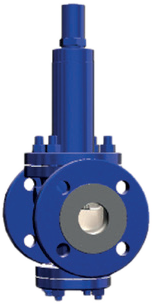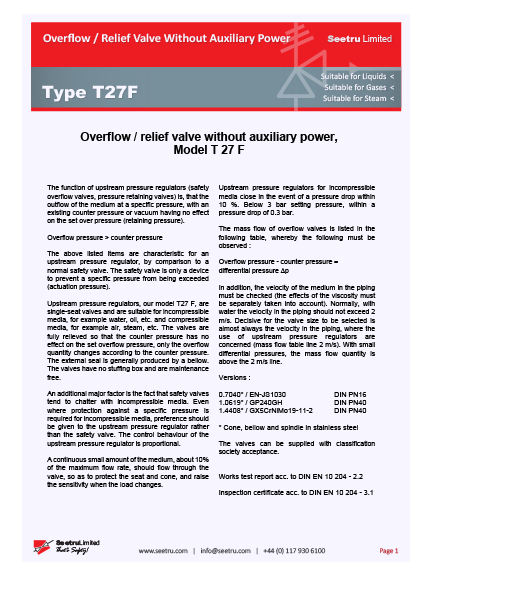Overflow valve – T27F
Self-operated, for liquids, gas, and steam
- DN15 to DN200 (1/2“ bis 8“)
- PN16 to PN40
- Outlet pressure: 0,5–40 bar
- With stainless steel bellow 1.4571
- For liquids, gases and steam
- EN-JS1030, 1.0619, 1.4408, 1.4469, CC480K, CC333G
The overflow valve T27F is a single-seat valve and is especially suitable for incompressible media, for example, water, oil (lubrication oil, fuel oil, HFO, LFO, MGO), etc. The valves are fully relieved so that the back pressure has no effect on the set (overflow) pressure, only the flow quantity changes according to the pressure difference.
Technical Information
Technical Information for Type T27F
-
Valve SizesDN15 bis DN200 (1 /2” bis 8”)
-
Pressure RatingPN16- PN40
-
Flange according toContact Seetru
-
MaterialsContact Seetru
-
Temperature rangeContact Seetru
-
Modular construction systemContact Seetru
-
With inside pulse lineContact Seetru
-
Outlet pressureSet pressure: 0,5 - 40 bar
-
SealingContact Seetru
-
Suitable for compressible and incompressible mediaContact Seetru
-
Max. reduction ratioContact Seetru

The function of overflow valves (relief valves, pressure retaining valves) is, that the outflow of the medium at a set pressure, in which an existing back pressure or vacuum does not affect the set overpressure (retaining pressure). The above-listed items are characteristic of an upstream pressure regulator, by comparison to a normal safety valve. The safety valve is only a device to prevent a specific pressure from being exceeded (set pressure).
Pressure Tamers
When pressure builds within your system, it’s not just the gauge needle that jumps. Overflow valves act as pressure relief valves, automatically opening at preset thresholds to safely vent excess pressure and maintain system stability.
Downloads
View or Download the Type T27F Datasheet
Full Technical Information - Including Flow Rates

View or Download the Type T27F Datasheet
The function of overflow valves (relief valves, pressure retaining valves) is, to the outflow of the medium at a set pressure, in which an existing back pressure or vacuum does not affect the set overpressure (retaining pressure). The above-listed items are characteristic of an upstream pressure regulator, by comparison to a normal safety valve. The safety valve is only a device to prevent a specific pressure from being exceeded (set pressure).
Find your PDF Download for the Type T27F below…
Visit our downloads page for other Seetru product brochures and catalogues
Oops! We could not locate your form.
Contact Seetru
